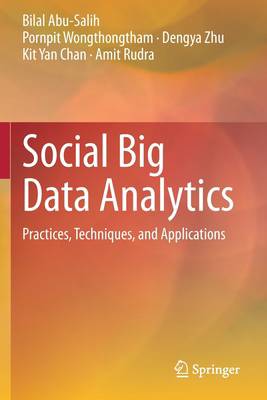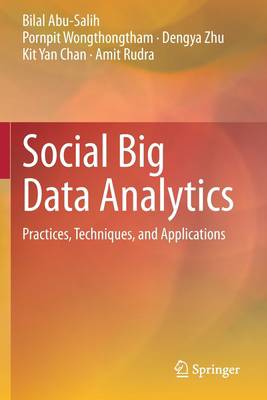
Bedankt voor het vertrouwen het afgelopen jaar! Om jou te bedanken bieden we GRATIS verzending (in België) aan op alles gedurende de hele maand januari.
- Afhalen na 1 uur in een winkel met voorraad
- In januari gratis thuislevering in België
- Ruim aanbod met 7 miljoen producten
Bedankt voor het vertrouwen het afgelopen jaar! Om jou te bedanken bieden we GRATIS verzending (in België) aan op alles gedurende de hele maand januari.
- Afhalen na 1 uur in een winkel met voorraad
- In januari gratis thuislevering in België
- Ruim aanbod met 7 miljoen producten
Zoeken
Social Big Data Analytics
Practices, Techniques, and Applications
Bilal Abu-Salih, Pornpit Wongthongtham, Dengya Zhu, Kit Yan Chan, Amit Rudra
Paperback | Engels
€ 244,45
+ 488 punten
Omschrijving
This book focuses on data and how modern business firms use social data, specifically Online Social Networks (OSNs) incorporated as part of the infrastructure for a number of emerging applications such as personalized recommendation systems, opinion analysis, expertise retrieval, and computational advertising. This book identifies how in such applications, social data offers a plethora of benefits to enhance the decision making process.
This book highlights that business intelligence applications are more focused on structured data; however, in order to understand and analyse the social big data, there is a need to aggregate data from various sources and to present it in a plausible format. Big Social Data (BSD) exhibit all the typical properties of big data: wide physical distribution, diversity of formats, non-standard data models, independently-managed and heterogeneous semantics but even further valuable with marketing opportunities.
The book provides a review of the current state-of-the-art approaches for big social data analytics as well as to present dissimilar methods to infer value from social data. The book further examines several areas of research that benefits from the propagation of the social data. In particular, the book presents various technical approaches that produce data analytics capable of handling big data features and effective in filtering out unsolicited data and inferring a value. These approaches comprise advanced technical solutions able to capture huge amounts of generated data, scrutinise the collected data to eliminate unwanted data, measure the quality of the inferred data, and transform the amended data for further data analysis. Furthermore, the book presents solutions to derive knowledge and sentiments from BSD and to provide social data classification and prediction. The approaches in this book also incorporate several technologies such as semantic discovery, sentiment analysis, affective computing and machine learning.
This book has additional special feature enriched with numerous illustrations such as tables, graphs and charts incorporating advanced visualisation tools in accessible an attractive display.
This book highlights that business intelligence applications are more focused on structured data; however, in order to understand and analyse the social big data, there is a need to aggregate data from various sources and to present it in a plausible format. Big Social Data (BSD) exhibit all the typical properties of big data: wide physical distribution, diversity of formats, non-standard data models, independently-managed and heterogeneous semantics but even further valuable with marketing opportunities.
The book provides a review of the current state-of-the-art approaches for big social data analytics as well as to present dissimilar methods to infer value from social data. The book further examines several areas of research that benefits from the propagation of the social data. In particular, the book presents various technical approaches that produce data analytics capable of handling big data features and effective in filtering out unsolicited data and inferring a value. These approaches comprise advanced technical solutions able to capture huge amounts of generated data, scrutinise the collected data to eliminate unwanted data, measure the quality of the inferred data, and transform the amended data for further data analysis. Furthermore, the book presents solutions to derive knowledge and sentiments from BSD and to provide social data classification and prediction. The approaches in this book also incorporate several technologies such as semantic discovery, sentiment analysis, affective computing and machine learning.
This book has additional special feature enriched with numerous illustrations such as tables, graphs and charts incorporating advanced visualisation tools in accessible an attractive display.
Specificaties
Betrokkenen
- Auteur(s):
- Uitgeverij:
Inhoud
- Aantal bladzijden:
- 218
- Taal:
- Engels
Eigenschappen
- Productcode (EAN):
- 9789813366541
- Verschijningsdatum:
- 12/03/2022
- Uitvoering:
- Paperback
- Formaat:
- Trade paperback (VS)
- Afmetingen:
- 156 mm x 234 mm
- Gewicht:
- 326 g

Alleen bij Standaard Boekhandel
+ 488 punten op je klantenkaart van Standaard Boekhandel
Beoordelingen
We publiceren alleen reviews die voldoen aan de voorwaarden voor reviews. Bekijk onze voorwaarden voor reviews.









